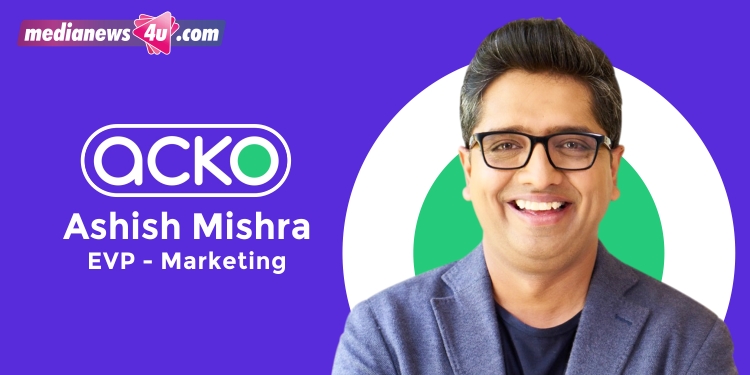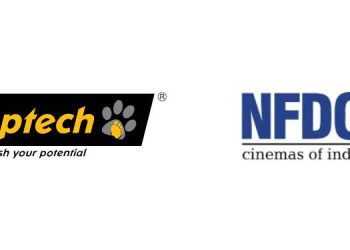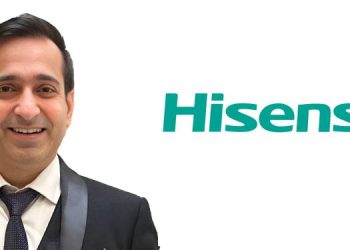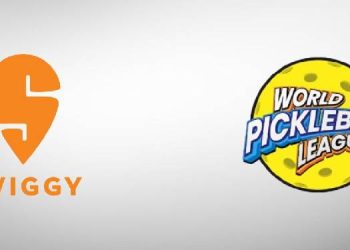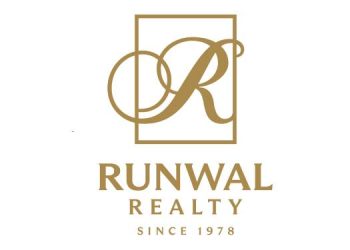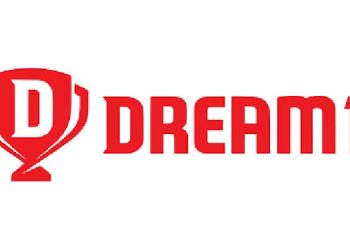When Ashish Mishra started off at digital insurance player Acko in 2020 and wanted to hire a research firm, he was in for a shock. The folks he called weren’t as familiar with the brand as he would have liked. The task ahead was evident for the EVP of Marketing, who moved from HSBC in Dubai, an organisation he had been with for 14 years. In the three years since then, brand Acko has seen a 3x increase in top of mind awareness, spontaneous recall and consideration scores. Mishra says he has had absolutely no reason to regret not taking up an offer to head marketing for HSBC in Malta, and moving to join fellow MICAn and Founder-CEO of Acko Varun Dua instead.
Judging by the consistently cut-through communication we have seen on the brand, it has been quite a ride. With the brand just making its foray into health insurance and having secured the licence to enter life insurance, there is a lot of work ahead.
“I wouldn’t have had this kind of opportunity in any MNC,” notes Mishra, who spent four years at the start of his career in advertising before switching to the client side.
There has been no dearth of action at Acko, which was launched in 2016, allowing and necessitating a significant marketing push. Creating awareness was an acknowledged challenge. Communicating that the brand was different was also important. Doing both the way Acko has, has earned the brand accolades and moved the needle on sales.
Advantage Acko
While the brand achieved unicorn status in 2021, it realised the need and found the time to create a mother brand positioning only last year – ‘Welcome Change’, created in partnership with Super Union. Until then, it was about communicating the advantages of Acko in the relatively low-involvement auto insurance category. The lower price advantage as a D2C company had to be driven home, alongside the ‘no-hassles’ promise.
In 2020, IPL was pushed to the second half of the year, allowing Mishra who joined in August to take the reins of Acko’s association with teams. The brand found a fit on player helmets, aligned with ‘protection’. The need to be seen and to establish the brand was so critical that Acko even ran a ‘Catch the logo’ contest, recalls Mishra.
A campaign featuring Javed Jaffrey themed ‘Car Insurance Ke Tedhe Games’ hit screens. It was a hit with consumers, reveals the marketing head.
The cost advantage had its own share of challenges. People did not believe that an insurer could offer such low prices. The next IPL was around the corner. Acko was partnering three teams, and the agency had a three-pronged brief: to use IPL players, handle the issue of believability of cost, and make viewers download the app. That’s how ‘India ab maan lo, Acko app check karlo’ was born, featuring actor Arshad Warsi and several cricketers from the Mumbai Indians and Delhi Capitals teams. That campaign ran for almost a year.
The brand also shifted gears strategically, from urging people to renew their car insurance with Acko to pitching insurance for new cars on the app.
“There was a real opportunity to encourage buyers to choose Acko when they buy a brand new car because significant value comes out in the new car segment. The difference we claim in our communication is Rs.36,000 but in certain models, it can go up to Rs.80,000,” notes Mishra.
The share of new car insurance for Acko is now 20 percent of all car insurance sold by the company.
Welcoming Change
Acko’s presence has expanded from the top six to eight cities in India in 2020 to 20 cities in 2023. The company’s market share in metro cities has increased by 2.5x, reveals Mishra.
In Mumbai, a key market, Acko was growing but the brand wanted to accelerate that growth. A local push ensued, built on the positioning of ‘Welcome Change’.
https://youtu.be/6-Fgi3f35L4?feature=shared
The film captured the positive changes that Mumbai has embraced over the years. Shot in black and white, it brought to life elements like football now being practised at Shivaji Park, the new graffiti that adorns Sassoon Dock, air-conditioned Mumbai locals and more. Timed to release around Valentine’s Day, it ends with the message ‘Celebrating Change. Celebrating Mumbai.’
“Sometimes I believe that the best work happens not by design, but it just lands up. Full credit to the photographer Prashant Godbole and filmmaker Mahesh Gharat. It was supposed to be an ad, with a guy getting out of the car, and a message from Acko. When I looked at the film in the studio, I had goosebumps. I stepped out and said let’s drop it like a love song rather than make an ad. It was close to Valentine’s. Everyone panicked because this was not what was planned. But the film evokes emotion like no ad film can. People welcomed it. We broke the rules with that one. I felt, why will people not respond to a brand that genuinely shows its love for the city?” poses Mishra.
While it all worked out very well, the marketer admits to anxiety pangs on the day before launch. “In the last few campaigns we have been pushing the boundaries so much that there is the worry that we could fall so flat,” he confesses.
While the ‘Ode to Mumbai’ film was shortlisted at the Film Craft category at the Cannes Lions this year, it also worked on consumers – not the most common of combinations. Recall was up 30 pc, spontaneous awareness up 42 pc and consideration rose 20 pc year on year, says Acko’s brand track data. The icing on the cake was that business from the city was up 40 pc, notes the EVP.
“Sometimes when you stop throwing messages at people and just put something genuine out, people respond,” he notes.
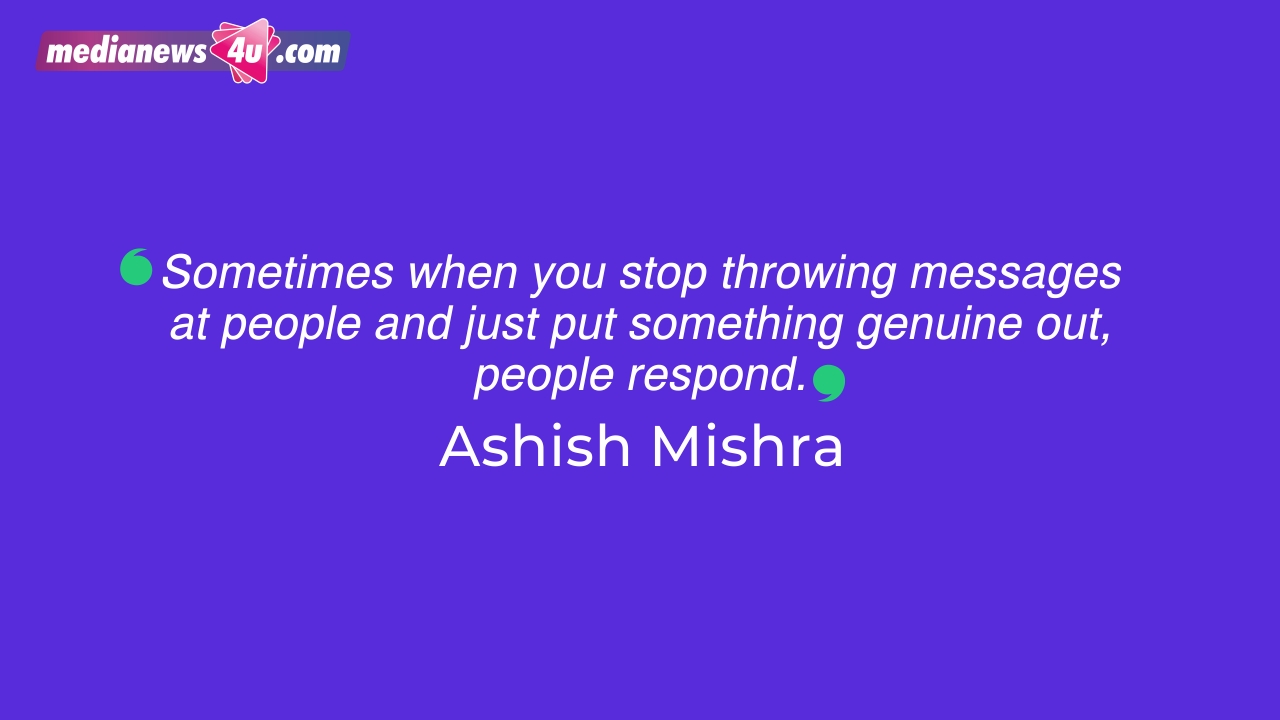
Munna Bhai 3.0
The biggest risk that the brand has taken to date is possibly in its latest campaign for its retail health insurance product featuring Sanjay Dutt and Arshad Warsi, who reprise their roles from the Munna Bhai franchise. The director of the movies, Rajkumar Hirani, was also the one directing the ad films. A BTS video from the shoot led to people believing that part three of the Munna Bhai series was coming – it was testimony to the fact that people were eager to welcome the characters back.
It started, recalls Mishra, with an idea that came up after three or four rounds of discussions with agencies. Someone suggested a plot about two men taking their father to the hospital.
“What if the two men were Munna and Circuit?” pondered Mishra. It seemed far-fetched, but a discussion with Hirani got things moving. To the marketing team’s surprise, there was an instant buy-in at the company’s end despite the ‘skyhigh’ cost. Such was the belief across the board that Munna and Circuit could help Acko disrupt the health insurance market like no one else could.
“It was about the DNA of Acko and that of Munna and Circuit. We want to change the insurance game because we believe that the current health insurance products are not truly designed for the consumers. And they were the perfect characters to ask questions like why a patient cannot get 100 pc claims, why they can’t scan bills and send them, and so on. A lot of credit should go to Mr.Hirani for simplifying the scripts. He has this great knack of simplifying very complicated topics,” explains Mishra.
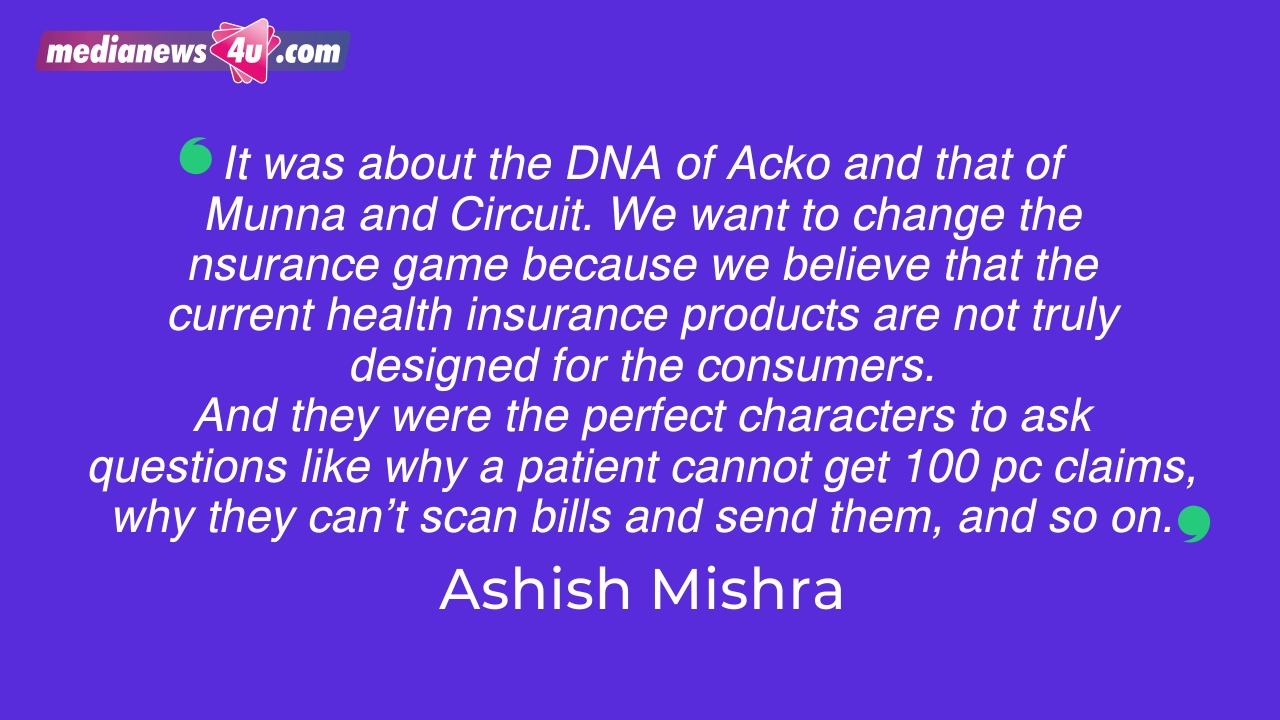
The films were ready in May and had to bide their time till September 17, when they were released during the Asia Cup final, ahead of the health insurance season of October to March. The ad went live during the match that was shockingly short with SriLanka bowled out for about 50 runs, laughs the marketing head. “You can’t plan for such things,” he muses.
The response from consumers has been ‘very positive’, says Mishra. He adds, “What is interesting is, the messaging is still clear despite the extremely popular Munna and Circuit in the ads.”
Feedback received by the team suggests that Acko may even have started a trend – of casting actors as their popular characters rather than as mere celebrities.
Scaling on Sales
Proof of the campaigns working is in the sales. Acko has seen a 5x increase in sales (gross written premiums) in the last three years, which corresponds to an 80 pc CAGR. This is across the categories of auto, travel, corporate employee health, embedded insurance and the retail health insurance offering that was soft launched a few months back and pushed aggressively last week with the Munna Bhai campaign.
Acko has also leveraged data to bring out reports on areas like accidents, theft and EVs. Who would have known that animals on the road are among the top three reasons for accidents, or that a white Maruti Swift is most likely to get stolen? Content will play an even more important role as the brand moves up the value chain of insurance into health, and soon life, notes the marketing head. The game will not just be about entertaining consumers and prospects, but also educating them.
As the brand scaled, its marketing budgets moved up – reportedly from Rs.45 cr two years earlier to Rs.150 cr in 2022 and Rs.250 cr in FY 2023. Of this, 10 pc was earmarked for sports-related spends, according to The Economic Times. The rising spends, says Mishra, are a percentage of the growing revenue.
This year, there will be a shift on several fronts. The brand will continue to invest in IPL but it remains to be seen how many teams it partners – discussions are underway. The media mix has also changed and will continue to, as the brand focuses on localised communication targeting specific markets. In the past too, it has embarked on localised campaigns.
“This year, a large chunk of our investments will be in building long term properties to help build memory structures in consumers’ minds,” states Mishra.
As things stand, TV takes up the largest share of spends, followed by OTT, OOH, digital (not including performance) and radio – in that order. Taken together, OTT and digital would form the largest chunk. The thrust is on appointment viewing with sponsorship of large properties like KBC and MasterChef, and advertising on big ticket events like cricket matches. The brand will be seen during the Asian Games this year, encouraged by surprisingly good response to advertising during last year’s CommonWealth Games. The returns will depend on India’s performance, reflects Mishra.
Consistency is King
Across markets,the retention ratio for Acko in the auto category is at 70 pc, against an estimated industry average of 50 pc, notes Mishra.
Last year, the brand conducted a five-market study to realise that the awareness had gone up significantly, but there was an issue with the ‘quality’ of awareness. The question on consumers’ minds was: will they really settle my claim? Stress-free settlements took centre stage more recently under the ‘Welcome Change’ umbrella.
Along the way, a multi-film campaign for bike insurance also made people take notice of the brand, speaking the language of convenience and savings but in the consistently humorous tone of voice the brand has adopted.
The brand featured actors Sara and her father Saif Ali Khan in another set of commercials more recently, underlining the substantial quantum of savings and on-site accident assist feature, besides urging the old-school to get rid of inertia and embrace Acko for car insurance.
Creative agencies the brand works with are Leo Burnett, DDB Mudra, Sideways Consulting and Ogilvy, while PHD is the media partner.
“I am really happy to see that both the Acko marketing team and the agencies we work with, have absolute clarity on the communication, on the kind of humour we employ while delivering the messages. I believe we have got it more right than wrong. My personal ambition is to do groundbreaking work – not stunts that get talked about, but insightful campaigns that also deliver,” surmises Mishra.
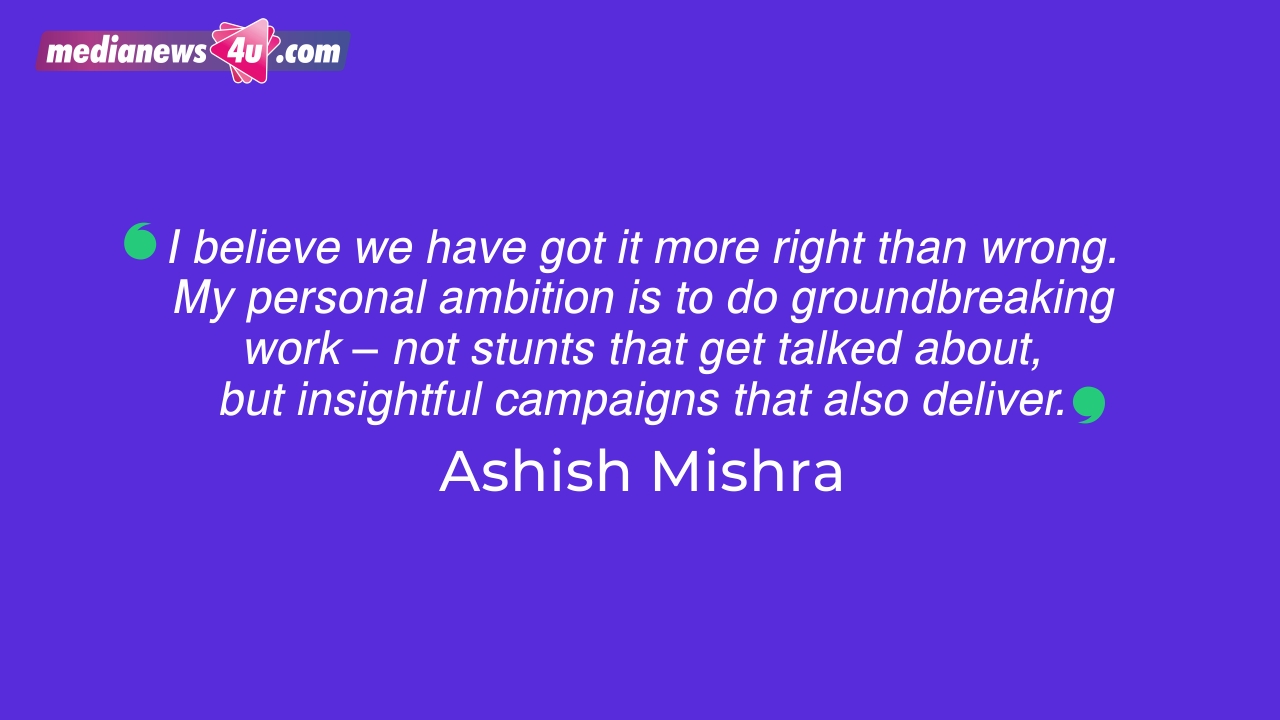
The brand has managed to cut through the clutter with a unique voice, carving a position for itself as a new age insurance offering. Will it be able to stay true to that voice and live up to expectations as it moves into the life insurance space? We’ll know soon.
(First published by The Free Press Journal BrandSutra. Content powered by MediaNews4u.com. Feedback: [email protected])

